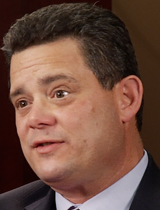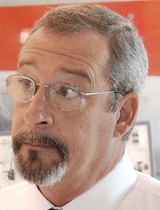The recession has changed economic development tactics, making the building of a skilled workforce to target businesses a top priority, economic development officials say.
 Daisy Jenkins, board member, TREO.
Daisy Jenkins, board member, TREO.What they call a "talent gap" is manifested in Arizona's jobs figures for July. The state's unemployment rate was 8.0%, with 241,000 people seeking jobs, the state Office of Employment and Population Statistics reported. At the same time, thousands of jobs are going unfilled because businesses can't find workers with the right skills.
"Think about the unemployment numbers, and you automatically, or people assume, there's no problem with hiring," said Daisy Jenkins, a board member of Tucson Regional Economic Opportunities. The organization, known as TREO, is a business-based coalition working to retain and attract businesses in Tucson.
"The issue is getting the right people with the right talent," Jenkins said in an Arizona Week interview. "So you have unemployment, but many of those unemployed, unfortunately, don't have the skills and the competencies that companies need today to remain competitive."
 Joe Snell, president and CEO, Tucson Regional Economic Opportunities.
Joe Snell, president and CEO, Tucson Regional Economic Opportunities.TREO President and CEO Joe Snell agreed, saying that the talent gap has led his organization to change its approach.
"Pre-recession, we saw a lot of issues such as location and incentives driving a lot of the decisions of corporations," Snell said, also in an Arizona Week interview. "Post-recession and going forward, we're seeing that the key driver in the future economy will be a company's ability to find skilled workers to fill their needs."
Economist George W. Hammond, associate director of the Economic and Business Research Center at the University of Arizona, said while job growth in Arizona is good - 67,600 more jobs in July than in the same month in 2012 - there is a long ways to go to make up for what was lost in the recession. Key to it will be fitting skilled workers to jobs, he and others said.
One program contributing to that is Pima Community College's Aviation Technology Center, where students learn airplane mechanics and repair work, leading to high-paying jobs in the industry.
 Tom Hinman, manager, Pima Community College Aviation Technology Program.
Tom Hinman, manager, Pima Community College Aviation Technology Program.It's an example of narrowing the talent gap, because the aerospace industry is a big employer in Tucson, Snell said, ranking fifth highest in the country.
At Pima's program, students spend two years studying and working hands-on with airplanes and equipment to acquire skills in one of three areas of expertise. Most of them get good jobs upon completion, some ranging above $50,000 a year, Aviation Program Manager Tom Hinman told Arizona Week.
"The majority of the students stay here in Southern Arizona," Hinman said. "There were 23 students who graduated in the early part of March, for example, and 19 had jobs here in Southern Arizona, the Tucson area."
One key aspect of the program is that an advisory board made up of executives and other officials of aviation businesses meets regularly to make suggestions on curriculum, provide needed equipment and offer scholarships to students, Hinman said. Thus the program can maintain the kind of training that will allow its graduates to find jobs.

By submitting your comments, you hereby give AZPM the right to post your comments and potentially use them in any other form of media operated by this institution.